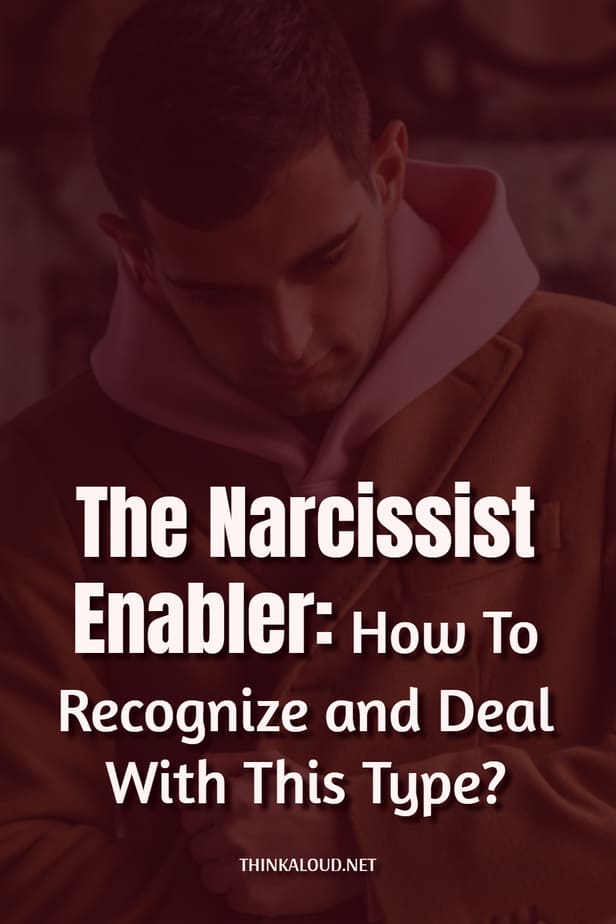The Narcissist Enabler: How To Recognize And Deal With This Type?

Here’s the thing. You shouldn’t go around throwing labels at people just because you recognize certain patterns of behavior that seem suspicious to you. Forming uneducated opinions is incredibly damaging to everyone involved. So, how do you recognize if someone is a narcissist or a narcissist enabler?
If you’re not a licensed therapist, you might want to try doing what most of us regular folks do when we have a hunch. The duck test; ”if it walks like a duck, and quacks like a duck, it’s a duck”, happens to be a valid way of taking notice of someone’s toxic traits.
You might think it sounds childish, but even licensed therapists first go through a period of observation. They take notice of a person’s manner and attitude towards different questions. While it’s never a good idea to generalize, there are a couple of conclusions you could draw through surveillance.
Once you recognize someone’s narcissistic tendencies, you might want to dig deeper. Believe it or not, there’s almost always someone enabling and justifying a narcissist’s actions.
Their credence and arrogant demeanor are just a well-thought-out facade. Narcissists are inherently dependent on others for self-assurance and encouragement. We are going to talk about narcissist enablers in depth later in the article. But, it doesn’t hurt to underline the immense influence they have.
Buckle up; because you’re in for an adventure! Who are narcissists and how do you recognize them? Who are the people that enable narcissists? How do you deal with them and how do you avoid becoming one of them? Keep reading to find out!
Who is a narcissist?

Narcissists are people who are extremely self-involved. What this does is make them ignore the needs of everyone around them. You might be able to recognize them if you take the time to observe their behavior and draw certain conclusions.
There are numerous traits that can help you determine whether someone’s a narcissist. Even if the person you’re suspicious of doesn’t tick all the boxes, they might still have some narcissistic tendencies.
Narcissists are incredibly superior and entitled. There is a hierarchy in their world that helps them feel as if they’re always on top. It doesn’t matter whether they’re the best or the worst at something, they just have to exceed everyone else.
Narcissists also feel the exaggerated need for attention and validation. It’s pretty easy to notice. They might follow you everywhere you go or constantly ask questions. They might even make you feel bad for not giving them enough attention. Trust me, they can never measure up to their own expectations!
Narcissists need everything to be perfect. They truly believe they should be perfect. Everyone around them should be perfect and everything should go as they envisioned it. Since that’s impossible to achieve, they spend most of their time complaining.
Narcissists are also extremely manipulative. They have to control everything and everyone around them because they’re never content with their life. In addition to that, their sense of entitlement makes them feel as if it’s completely logical to act that way. Who else is going to be in control?
Lack of empathy is an obvious sign of narcissism. They’re incredibly selfish and self-involved which makes it impossible for them to understand how other people are feeling. If you recognize most of these traits you might be dealing with a narcissist!
Who is a narcissist enabler?

”She’s your mother, you have to forgive her for whatever she’s done!” Have you ever heard anyone say something along those lines? ”How can you divorce him when it’s clear he needs your help?” A person who says things like this is typically referred to as a narcissist enabler.
Narcissist enablers are the people who support, defend, and fight for the narcissist. They enable the narcissist by putting up with his behavior, justifying his actions, and bailing him out of different situations.
Enablers are also known as flying monkeys. If you’ve never seen the Wizard of Oz you might be confused about where this term comes from. In the Wizard of Oz, the Wicked Witch sent out flying monkeys to do her dirty work and attack people on her behalf.
And that’s exactly what narcissists do with their enablers! When they’re targeting someone, narcissists manipulate their enablers into thinking that a certain person deserves punishment for something they’ve done. They don’t shy away from making things up and turning everyone against their target.
Flying monkeys aren’t malicious, quite the contrary. They’re typically highly sensitive, emotional, and empathetic. They take it upon themselves to right the wrong and correct an alleged injustice. The narcissist encourages and rewards this behavior. And as a result, the vicious circle continues.
You might be surprised to find out that a narcissist enabler could be anyone in a narcissist’s close vicinity. Here’s who to keep an eye on!
1. A parent with good intentions

”The road to hell is paved with good intentions.”
Isn’t that the truth? Sometimes narcissistic tendencies happen within the family. Typically, a parent with good intentions encourages the damaging behavior of their spouse or their children. Unfortunately, it’s quite difficult to deal with an enabler who’s a part of the family.
So, how can you recognize a parent as a narcissistic enabler? You might be looking at a mother who’s justifying her husband’s actions. Or even a mother who’s manipulating her children into thinking their father’s actions are a product of their misbehavior.
On the other hand, you might be looking at a father who’s constantly paying attention to the needs of one child while completely ignoring the other. The father might feel the need to hide one child’s narcissistic tendencies by making them appear normal.
Either way, enabling parents are typically bound to the narcissist out of love or concern. They don’t have malicious intent toward the narcissist’s victim, but they don’t know how else to deal with the situation. It’s easier for them to cave in for the sake of saving their family’s peace.
2. A child brought up by a narcissist
A narcissistic parent typically shares an unhealthy bond with their child. This bond might be mistaken for love, but… It’s important to remember that narcissists aren’t capable of loving anyone other than themselves.
A child that was brought up in a household run by a narcissistic parent typically becomes a narcissist enabler.
The reason for that is that the parent spends most of their life using him for different manipulative schemes. He does everything the parent says for the sake of earning their love.
The child enabler is typically brainwashed. He believes that pleasing his parent might bring some peace and happiness into the household. He will provide the narcissist with whatever he needs at the moment, regardless of the repercussions.
The narcissist wants to create chaos and conflict. Because of that, the child enabler might spy on other family members for the sake of creating drama. He might even pass on made-up stories in order to divide and conquer. He will even participate in quarrels trying to defend his parent.
It’s important to understand that the child enabler is typically innocent in these situations.
3. An unsuspecting wife

This is one of the most common situations when it comes to the narcissist and narcissist enabler dynamic. It’s not unusual for the wife to be enamored with her husband to the point where she ignores all the red flags; while simultaneously encouraging his damaging behavior.
Have you ever heard anything remotely similar to these examples?
”Your father had a reason to raise his hand at you! You probably did something to upset him!”, ”You don’t have to like what your father is asking you to do, you just have to do it!”, or even ”Look what you did! You made him angry!”
An enabler wife might think she’s doing the right thing by encouraging her husband’s actions. Chances are she might not even be aware of his narcissistic tendencies.
That’s why she continues to support and validate his abuse. She might not even understand that she’s just another one of his victims!
4. A narcissist’s mistress
Do you remember what we said about narcissists at the beginning? You shouldn’t be surprised to find out that numerous men who cheat on their wives happen to have narcissistic tendencies. Narcissists absolutely adore being the center of someone’s universe.
So, this is where the oblivious mistress comes to play. A narcissist makes her believe that she’s special and unlike any other woman. She’s the chosen one, the one destined to help him get out of his loveless marriage. But… There’s a catch.
A narcissist enabler is typically blind to elaborate schemes, neverending lies, and the narcissist’s victim mentality. Not only does the enabler mistress fall for everything the narcissist tells her, but she also encourages his behavior. She also usually feeds into the slander of his unsuspecting partner.
”He would have left his wife for me, but…” and ”He would leave her, but she’s threatening to take his children away from him!” are only some of the things she might say to other people to justify his actions. But once the novelty wears off, the narcissist will move on to his next victim.
5. Another narcissist

”Birds of a feather flock together.”
Apparently, they do! It’s not unusual for narcissists to surround themselves with people who share similar motives. Politicians, billionaires, and financial moguls typically join forces in order to carry out their elaborate schemes.
That’s exactly what narcissists do! They’re emotionally indifferent, meaning they don’t care how their actions affect other people.
They come together to exploit, diminish, and destroy their chosen targets. By enabling and encouraging each other’s malicious behavior, they’re bound to achieve their goals.
Narcissists and their narcissist enablers never shy away from using psychological tactics to bring their target down. They might resort to stonewalling, acting confused, and accusing their target of not making any sense. ”I have no idea what you want me to say! I didn’t do anything wrong!”
On the other hand, they might try countering and accusing their target. ”You’re imagining things! Get your facts straight!” They might even go as far as to trivialize their target’s concerns. They will say something along the lines of ”Why would you let something so stupid come between us?”
Unfortunately, when a narcissist enabler happens to be another narcissist, their targets don’t stand a chance.
How to deal with a narcissist enabler?
Believe it or not, narcissist enablers might be even more dangerous than narcissists themselves. When you think about it, they are the ones that do all the dirty work. Narcissists strategize and orchestrate the entire thing, but their flying monkeys are the ones that trap the target.
The narcissist might manipulate their enabler to hoover, triangulate, or even conduct smear campaigns against the target. In fact, triangulation is one of the most popular strategies used by narcissists and their enablers.
Triangulation is simply another term for the ”divide and conquer” strategy. It implies bringing another person into the conflict in hopes of stirring the pot in the wrong direction. Narcissists and their enablers do this to gain control, make their target feel insecure, and cause a conflict.
Do you recognize any narcissists and narcissist enablers in your close vicinity? You might be wondering how to protect yourself and deal with them successfully.
Here’s the tea – you should take notice of the situation, avoid conflict, act uninterested, limit your time with them, set boundaries, and cut ties.
1. Take notice of the situation

You’ve already done the first step! So, you’re wondering whether you’re dealing with a narcissist or a narcissist enabler. Let’s take a look at different ways you can confirm your suspicions.
You can recognize a narcissist by looking for common narcissistic traits like superiority and the feeling of self-entitlement.
Additionally, keep an eye out for perfectionism, exaggerated need for attention and validation, lack of empathy, and manipulative behavior. And don’t forget that your narcissist doesn’t have to express all of these traits!
If you’re trying to recognize a narcissistic enabler… You might want to take notice of their behavior when they’re around the narcissist.
They’re usually the people in his close vicinity who justify his behavior. They encourage and support his actions, and express unconditional love.
It’s important to understand that most narcissists enablers have good intentions. They might even be completely oblivious to the narcissist’s malicious motives. They’re simply manipulated into thinking that they’re helping him correct someone else’s wrongdoings.
2. Avoid conflict
‘‘Never wake the sleeping lion.”
This article is packed with useful proverbs, and here’s what this one means. If you recognize someone’s narcissistic tendencies you should avoid picking a fight with them, as it might backfire. Even more so, you should avoid picking a fight with their narcissist enabler.
If the narcissist enabler feels attacked you’ll risk becoming the narcissist’s target. He might take notice of your attempt to have a conversation with his enabler. And he might feel intimidated by your actions and decide to eliminate you as the potential threat to his reputation.
And you might show the narcissist that you possess empathy and compassion. While that might not sound like a big deal to you… The narcissist typically chooses his next target based on qualities he doesn’t possess. Jealousy is quite a dangerous thing!
You shouldn’t ignore the situation entirely, but you should stay out of direct conflict with either of them. The best thing you can do is observe the situation.
Take notice of any changes or developments when it comes to their current target. Lastly, try to stay calm and collected!
3. Act uninterested

And what to do if you’re already a narcissist’s target? A narcissist enabler might try all the different strategies to get you to crack. But, you shouldn’t allow them the satisfaction of seeing you down. You’re better than that!
So, here’s what you should do. Familiarize yourself with different things a narcissist enabler might tell you to get a reaction out of you. ”You’re blowing this out of proportion!”, ”There’s nothing wrong with my memory, I never said/did that!”, or even ”You’re always picking fights about stupid things.”
They might even go as far as to turn you against your own family or friends. A narcissist enabler might tell you something that will make you question everything you know. ”Oh, your father only repeated what your sister said in the first place.”, or ”It’s not his fault that your friend has a big mouth!”
It might be difficult, but you shouldn’t let them see your reaction. Try acting uninterested, while understanding, or even manipulating them into thinking you agree with them. You have to remember that the narcissist is the one who’s doing this on purpose. The enabler probably has no idea what’s going on.
4. Limit your time with them
Are the narcissists and the narcissist enabler a part of your family? Are they a part of your friend group? If yes, this might be an incredibly difficult task for you. You shouldn’t be surprised if you feel pressured and manipulated into having a conversation with them.
You might want to distance yourself from your own good. Even if you’re unable to physically remove yourself from the situation, you can limit the time you spend together. Focus on yourself, your career, and other social connections.
If the narcissist and the narcissist enabler are a part of your friend group… Well, you should keep an eye out for any signs of triangulation. In fact, you shouldn’t let them manipulate you into thinking your friends are plotting against you, or talking about you behind your back.
”Oh, your best friend texted me and we talked about you all night.”, or even ”Everybody says I’m the glue of the group. If it wasn’t for me they wouldn’t hang out with you.” Don’t fall for their cheap tricks, and if you have any questions you can ask your friends. Don’t let them divide and conquer!
5. Set boundaries

So, when you’re dealing with a narcissist and a narcissist enabler you have to be able to set boundaries. Don’t expect them to respect your boundaries from the get-go. But, there are a couple of things you can do to ensure you protect yourself from their damaging influence.
Firstly, don’t explain yourself to them. If you do, you will only give them a sense of power and control.
Narcissists use intimidation to make others second-guess themselves, and their enablers follow the lead. The less information you share with them, the less they have to use against you.
Learn to ignore intrusive questions and negative comments. Trust me, there’s nothing in this world that would make them angrier.
Have you seen celebrities on The Ellen Show skillfully avoiding uncomfortable questions? They change the subject or shift the focus on the interviewer. You can do the same thing!
Lastly, remove yourself from the situation as soon as you don’t feel comfortable. The narcissist enabler might start attacking you and manipulating you into thinking you did something wrong. You should simply excuse yourself. Say something along the lines of ”Oh, look at the time.” and leave!
6. Cut the ties
”No one can make you feel inferior without your consent.”
If everything else fails… Well, your last resort is to completely cut the ties with the narcissist as well as the narcissist enabler. A big part of setting boundaries is being prepared for consequences in case your efforts fail.
The narcissist and the narcissist enabler are still going strong with their manipulative mind games? You have no other choice than to eliminate them from your life. This might be extremely difficult if they’re a part of your family or your close friend group. But…
If they don’t take your needs into consideration, don’t respect your boundaries, manipulate you for their own gain, and make you feel betrayed and unsafe in your own house – there’s nothing else left to do. You might want to consider the gray rock technique before eliminating all contact.
In fact, the gray rock technique is quite a popular method of communication. It implies that you answer all their questions in the most boring, non-emotional way possible – like a gray rock.
So, there should be nothing engaging or interesting about your responses. If they don’t take the hint, that’s your cue to cut the ties completely.
How to avoid becoming a narcissist enabler?

”If you can’t beat them, join them!” shouldn’t be the rule for this situation. You’re someone who’s dealing with a narcissist in your close vicinity? You should take a couple of steps to avoid becoming a narcissist enabler.
Firstly, understand the situation. If you’re aware that your husband, child, or close friend frequently expresses narcissistic tendencies, you should understand where they’re coming from. You shouldn’t immediately assume their intentions are malicious. Make sure to form educated opinions!
Secondly, don’t let them take advantage of you. Narcissists are incredibly successful at having things go exactly the way they planned. They might want you to put all your attention on them, and ignore your own needs and desires. Don’t let them manipulate you!
Lastly, make yourself a priority. Focus on yourself, surround yourself with people who care about you, and work on becoming a better person. Set some healthy boundaries and make sure you react appropriately if the narcissist oversteps them. It won’t be an easy task, but it will be a rewarding one!




